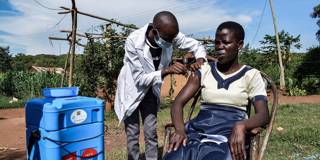Minority communities and developing-country populations may approach health services cautiously – and with good reason, given the medical profession's history of inhumanity. But, by blaming low COVID-19 vaccination rates on vaccine hesitancy, the profession is effectively using this history to victimize the same communities again.
JOHANNESBURG/SEATTLE/ADDIS ABABA – When the United States began to roll out COVID-19 vaccines earlier this year, uptake in black communities lagged behind their white counterparts. Many assumed this was by choice: the history of medical abuses against them had supposedly left African-Americans mistrustful of the public-health intervention. A similar vaccine hesitancy has also purportedly hampered efforts to vaccinate African populations.
But this narrative amounts to little more than obfuscation.
To be sure, minority communities and developing-country populations may approach health services cautiously – and with good reason. From the gynecological experiments J. Marion Sims performed on enslaved black women in the 1800s to the four-decade-long Tuskegee Syphilis Study, in which infected black men were observed but not treated, there is no shortage of instances of medical abuse against African-Americans.

JOHANNESBURG/SEATTLE/ADDIS ABABA – When the United States began to roll out COVID-19 vaccines earlier this year, uptake in black communities lagged behind their white counterparts. Many assumed this was by choice: the history of medical abuses against them had supposedly left African-Americans mistrustful of the public-health intervention. A similar vaccine hesitancy has also purportedly hampered efforts to vaccinate African populations.
But this narrative amounts to little more than obfuscation.
To be sure, minority communities and developing-country populations may approach health services cautiously – and with good reason. From the gynecological experiments J. Marion Sims performed on enslaved black women in the 1800s to the four-decade-long Tuskegee Syphilis Study, in which infected black men were observed but not treated, there is no shortage of instances of medical abuse against African-Americans.